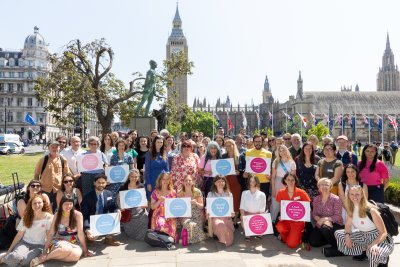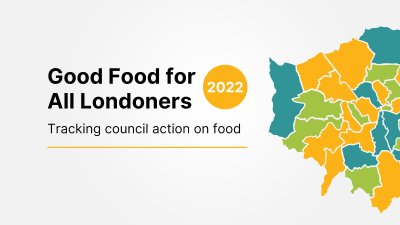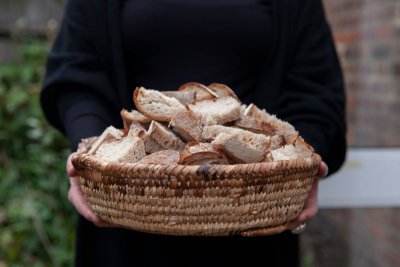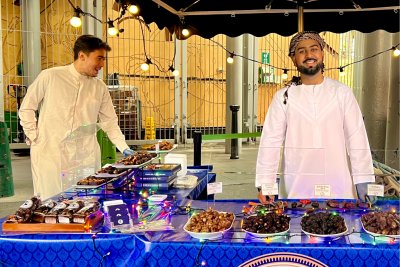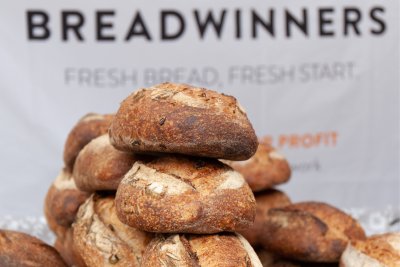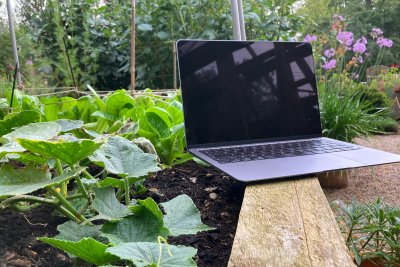Mayor calls on Londoners to pledge 'bee friendly' behaviour
LIDA agency, part of M&C Saatchi, produce Tube and 'Bee-movie' campaign based on work of cult artist to rally Londoners
50 winners of community bee-keeping training, hives and bees announced as part of Capital Growth
The Mayor of London, Boris Johnson today (13 June) launched an innovative campaign to encourage 'bee-friendly' behaviour and help support London’s vital bee population.
Award-winning creative team LIDA, part of M&C Saatchi, have redesigned original artwork by cult artist Magnus Muhr, known for his imagery of dead flies. The eye-catching campaign instead uses images of dead bee and simple line drawings to highlight the plight of London’s bee population. The artwork shows bees on a drip, on a stretcher and in a hospital bed. The 'bee-movies' show bees taking part in everyday London-based adventures which put them in peril, such as cleaning a window or travelling on the Tube.
These visuals will take the form of striking billboards appearing across the London Underground network from Friday June 17 and humorous video clips with a serious message, which are hoped to go viral across the internet. Screensavers and desktop images will also be available for download. This creative design work by a world-class agency has been done on a pro-bono (no cost) basis.
The aim of the campaign is to encourage Londoners and organisations to come to the rescue of bees. People can visit the Capital Growth website www.capitalgrowth.org/bees/ to find out why bees are essential to life as we know it and to pledge their dedication to help London’s bee population thrive. Organisations from the Co-op to the Women’s Institute and the Soil Association have also pledged support.
Pledges can be personalised but suggested bee-friendly behaviours include growing your own bee-friendly food including fruit trees, tomatoes and soft fruits, shopping for bee-friendly foods such as locally sourced honey and choosing bee-friendly gardening by minimising use of pesticides.
In addition, the Mayor has announced the winners of the Capital Growth bee competition to create 50 community hives. Groups are attending bee-training sessions before being given hives, equipment and a spring bee colony next year. Training ranges from classroom-based including specifics on urban beekeeping and equipment knowledge, to the practical, such as hands-on experience of making honey and siting or building hives. The 50 organisations to receive hives span 22 London boroughs (listed below) and each is expected to act as 'bee-friendly' ambassadors to help spread a love of bees and knowledge of urban bee-friendly behaviour. The organisations include schools, universities, housing estates, a synagogue and even a cemetery.
Boris Johnson, Mayor of London, said: 'I want London to boast a great quality of life making it an attractive place to live, work and visit. Protection of our environment is an important part of this. My 'bee-friendly' pledge as Mayor is to zealously safeguard our city's green spaces. Through Capital Growth, we aim to create 2012 community food growing spaces in London by 2012 which will provide nectar-rich plants for bees. As part of this, we are supporting the development of 50 new community bee hives across London to create sanctuaries for the urban bee.'
Rosie Boycott, Chair of London Food, said: "The Capital Growth project has kick-started a "Grow your Own" revolution with the creation of over 1000 new community food growing spaces in London. The crops which are being planted need bees for pollination so now is the perfect time to adopt bee-friendly behaviours. We are honoured that LIDA, part of M&C Saatchi has helped us at no cost to develop such a world-class campaign to spread our message.'
Nicky Bullard, creative director at LIDA, said: ‘As we all know, the bee population is continuing to decline causing potential but very serious implications for human life. With more people living in London and cities a like, it’s imperative that we take the time to learn more about this decline and find out ways to help the bees whether it is planting bee friendly plants of starting your own bee hive. It’s an honour to have been awarded this project and we are really looking forward to getting stuck in, driving the message across London.’
Mikey Tomkins, London Food Link, said: 'With more people unable to find allotments, many are looking for alternative spaces to produce food. To do this it is vital to protect our local pollinators. Honey bees in particular are crucial as they are the main pollinator people can manage, yet the number of bee hives in use is in decline in the UK. This is one of the reasons why Capital Bee is helping to train 50 community beekeepers in the capital.'
Bees are a vital part of our ecosystem - they pollinate at least 30 percent of the food crops we consume. They are directly responsible for the growth of many fruits, vegetables, live-stock feed and even cotton for fabrics. One in three mouthfuls of the food we eat is dependent on pollination. Furthermore, bee and insect pollination contributes around £430m a year to the economy. In the winter of 2009/2010 alone, Britain lost a shocking third of its bee colonies. Due to the milder climate, more diverse forage and more controlled use of agricultural chemicals, large cities are becoming havens for bee populations.
Capital Bee is part of Capital Growth, a partnership initiative between London Food Link, the Mayor of London Boris Johnson, and the Big Lottery's Local Food Fund. It aims to boost community food growing, creating 2,012 new food growing spaces by the end of 2012. There are now 1,000 plots already up and running in a diverse range of places, such as schools, by railways, on housing estates and on roofs.
Notes to Editors:
1. The following community organisations have won the Capital Bee competition:
Borough Organisation
Barnet Finchley Horticultural Society
Bexley Friends of Crossness Nature Reserve
Brent Preston Park Primary School
Bromley Capel Manor College
Tugmutton Allotment Association
Camden JCC for London
Croydon Trinity School
Ealing Ealing Transition
Ealing Council
Enfield Forty Hall Community Vineyard
Broomfield Community Orchard
Mind in Enfield
Caversham Avenue Green Space
Greenwich Walpole Estate Management Board
Millennium Primary School
Christ Church Primary School
Charlton Manor Primary School
Hackney Growing Communities
The Future Laboratory
Core Arts
London College of Fashion, Mare Street
Haringey HAIL/Circle 33
Fortis Green Community Allotments Trust
Highgate Synagogue
The Meadow Orchard Project
Positive Earth Project in collaboration with Thornton's Budgens
Hounslow Chiswick House and Gardens Trust
Islington CHUG
Grass Shoots
Global Generation
Hungerford School & Children's Centre
Lewisham Wallerbees
Breakspears Backgardens
Newham Leaside Regeneration
Redbridge Seven Kings & Goodmayes Allotment Society
Richmond St Mary's University College
Southwark Bethwin Road adventure playground
Growing Southwark: Cossal Estate Community Growth Project
Community Space Challenge
give peas a chance
Eden Caterers Limited
Herne Hill Climate Action Network
Sutton BioRegional Development Group
Tower Hamlets St. Patricks Kitchen Garden Project
Bow Arts Trust
Wandsworth Roehampton University
Garratt Park Allotments
Woodshaw Beekeepers
Friends of Streatham Cemetery
Westminster Franklin Project Management
2. Winners will receive a beehive, the protective clothing, basic tools, training, mentoring and support.
3. LIDA is a unique direct, digital and integrated marketing agency which fuses offline marketing skills with online communications: http://www.lida.com/
4. One in three mouthfuls of the food we eat is dependent on pollination. The UN Food and Agriculture Organisation (FAO) estimates that of the more than 100 crop species that provide 90% of food supplies for 146 countries, 71 are bee-pollinated. Some 84% of European crops and 80% of wildflowers rely on insect pollination.
5. Over the last 20 years, the area of crops dependent on insect pollination has increased by 38%. During the same period, there has been a 54% decline in honey bee colony numbers in England. These changes have been driven by more than a dozen factors including habitat loss, farming practices, declines in flowering plants, the use of insecticides, the spread of pests and air pollution. The National Bee Unit (NBU) has found that in 2008/9 14% of colonies died over winter and in 2009/10 16% died.
6. Bees are responsible for the pollination of more than 40 important food crops grown in this country. Apples, pears, cherries, raspberries, blackcurrants, melons, and blackberries are just some of the fruits that are pollinated by bees. Many other crops such as beans, tomatoes, peppers, pumpkins’ need bees for pollination.
7. UK National Ecosystems Assessment (DEFRA funded study) recently stated that, insect and bee pollination is worth around £430m to the economy in increased yields. The government recognises that the UK's honeybee hives - run by 44,000 mostly amateur beekeepers - contribute around £165m a year to the economy by pollinating many fruits and vegetables.
8. It makes much greater economic sense to protect and conserve pollinators than to adopt alternatives, such as hand pollination. The cost of replacing bee pollination with hand pollination is greater than the total market value of the crops, at over £1.5 billion per year.
9. Albert Einstein famously said: "If the bee disappeared off the surface of the globe, then man would only have four years of life left. No more bees, no more pollination, no more plants, no more animals, no more man."
Published Monday 13 June 2011
London Food Link: London Food Link brings together community food enterprises and projects that are working to make good food accessible to everyone in London to help create a healthy, sustainable and ethical food system for all.
